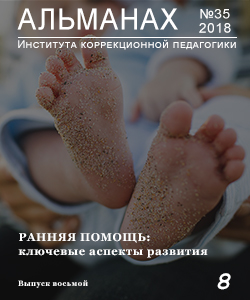Early intervention: key aspects of development
Almanac #35 · Issue #35 · 2018

Development of the age-psychological approachin modern psychology
The author analyses main tendencies in development of the age-psychological approach, based on Vygotsky's doctrine of structure and dynamics of psychological age. Tendencies defined: declaration of sociocultural nature of childhood and crisis character of child's development in modern society; modification of the conception of the object of development; transition from exploration of universal developmental patterns to investigation of individual cases; transition fromassessment of psychological development to deliberate social construction of childhood. The author describes features of social situation of development of a child in modern society and tendencies of development of childhood. Also, the author defines issues caused by the new conception of the object of development and admission of influence of communication and activity on child's development.
Keywords
Development of the age-psychological approachin modern psychology
Vygotskypsychological age
childhood
social situation of development
social construction of childhood
communication
object of development
Is communicative need inborn or acquired?
The article depicts development of ideas on the origin of communicative need in children according to cultural-historical approach. Ideas of L.S. Vygotsky, L.I. Bozhovich, M.I. Lisina on intravitalformation communicative need of arepresented. Also the author presents a brief review on research results from different countries on social-cognitive development and social child-adult interaction starting from the first months of life: there are evidence for inborn social activity and social competence of the child, his ability for social interaction with adults. The author describes «intersubjectivity» - inbornpsychological mechanism of social interaction.
Keywords
Is communicative need inborn or acquired?
infantscommunicative need
communicative development
needfor new impressions
social-cognitive development
social interaction
social competence
Pedagogical approaches to changing communicative behavior of mothers of toddlers with Down syndrome
The author presents his experience of teaching mothers to communicate with their toddlers with Down syndrome: how to observe the child`s behavior and identify his needs; how to give mother communicative skills, promoting child's communicative development. The article contains evidence for helping mothers to improve the quality of interaction with their children as a way of promoting child`s communicative development.
Keywords
Pedagogical approaches to changing communicative behavior of mothers of toddlers with Down syndrome
early interventionchild`s communicative development
children with Down syndrome
family support service
Communicative tools of a mother and her two-years-old child with central nervous system damage
,
The author analyses interaction of mothers and their wo-years-old children with central nervous system damage, emphasizing efficiency of different communicative initiatives of the mother and the child. There are evidence for mimic tools being more appropriate fore these children, then speech tools, and this is how progress in interaction can be achieved.
Keywords
Communicative tools of a mother and her two-years-old child with central nervous system damage
early interventionmother-child interaction in early years
communicative development in children with special needs
children with central nervous system damage
Interaction of children with severe developmental disorders with different types of adults in the orphanage
, ,
The author analyses the interaction of children with severe developmental disorders and profound mental retardation with orphanage stuff and other adults in the orphanage. Children demonstrate different communicative capacities with different adults: it depends on adult's communicative style. The author describes crucial characteristics of adult's communicative style, which define outcome of adult-child interaction.
Keywords
Interaction of children with severe developmental disorders with different types of adults in the orphanage
early interventionmother-child interaction in early years
children with severe developmental disorders
child`s communicative development
children with profound mental retardation
orphans
Psychological assistance to families raising children of early and preschool age with severe psychophysical pathology
The article presents the implementing of individualized programs of psychological assistance to families raising children with particularly severe psychophysical pathology. The study involved 39 families with children aged 2–7 years with cerebral palsy of high severity, combined with severe mental retardation. Conversation, interview, the "Unfinished sentences" method and the "Depression scale" by A. Beck were used to determine the psychological state of the parents. Based on the results obtained, an individual profile of psychological assistance for each family was determined: the leading and additional directions, the means used, the forms of work, as well as the number and frequency of meetings with the psychologist. In the course of psychocorrectional work, parents were taught how to interact with their child, maintain a positive emotional contact with him / her, form the simplest means of communication, train hygiene and self-service skills. Parents were also assisted in acceptance the current situation, in developing the strategies of coping with the identified psychological problems. Art therapy, games, relaxation, narrative techniques were used. As a result of psychocorrection, the emotional state of both the child and the parents was improved, the social adaptability of the family increased, which is illustrated by two clinical examples given in the article.
Keywords
Psychological assistance to families raising children of early and preschool age with severe psychophysical pathology
a child with severe psychophysical pathologycerebral palsy
severe mental retardation
psychological problems of the family
psychological assistance to the family
psychocorrection
Use of mother's of a blind child letters to a teacher in pedagogical process
,
Correspondence between parents of a blind child and a teacher can be used as an assessment tool to assess mother's ability to notice changes in child's behavior: information from the letters can be used by the teacher to plan his work with the family and to assess its efficiency. The author gives a list of themes most important for parents of blind children under three years old. The correspondence can promote improvement of parent's competence in interaction with their child.
Keywords
Use of mother's of a blind child letters to a teacher in pedagogical process
early interventiondistant counselling
blind child
family support service